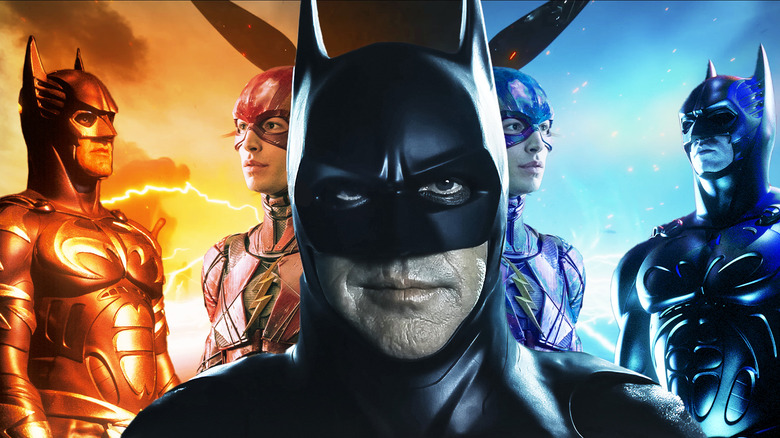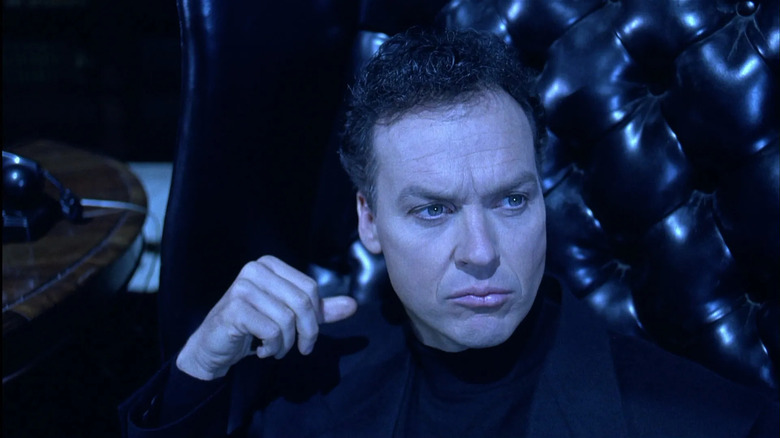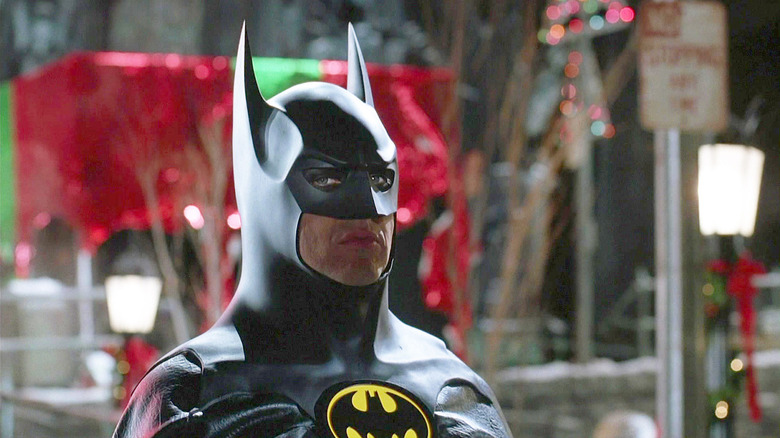Batman Forever Is 'Never' - The Flash Splits 1990s Batman Canon In Two (But That's A Good Thing)
The Flash is finally getting his own "solo" movie, but he's bringing a few buddies along for the ride. Taking influence from the "Flashpoint" comic book arc, the movie sees Barry Allen (Ezra Miller) travel back in time to save his mother from dying. In the process, he'll open up the multiverse, where things aren't exactly the way he remembers them.
As we can see from "The Flash" trailer, we'll get a new last child of Krypton in the form of Supergirl (Sasha Calle), leading the charge against General Zod (Michael Shannon). That's not the only change-up. While Ben Affleck's Batman will appear, he'll be replaced by the Caped Crusader played by Michael Keaton, last seen in 1992's "Batman Returns." It's been over 30 years since Keaton suited up as the Dark Knight, but fans are delighted to see him return.
Of course, Keaton's Batman exile was intentional. After "Batman Returns," Joel Schumacher was brought on to replace Tim Burton and take the franchise in a lighter direction. This went against Keaton's goals, and he later said in an interview (now archived on The Wrap), "At one point, after more than a couple of meetings where I kept trying to rationalize doing it and hopefully talking [Schumacher] into saying 'I think we don't want to go in this direction, I think we should go in this direction.' And he wasn't going to budge." Val Kilmer replaced Keaton, and at the time, it appeared "Batman Forever" and "Batman & Robin" took place in the same universe as Burton's movies, as evidenced by characters like Gordon and Alfred being played by the same actors.
However, Keaton's inclusion in "The Flash" means that Burton and Schumacher's Batman movies officially exist in separate universes, opening up a multiverse of possibilities.
In The Flash, Keaton has continued being Batman for a long time
Despite the fact Gotham looks very different in Burton's movies than Schumacher's, "Batman Forever" was definitely intended to take place in the same timeline as its predecessor. After all, "Batman Forever" has Dr. Chase Meridian (Nicole Kidman) reference Batman's romance with Catwoman (Michelle Pfeiffer), and Val Kilmer's Batman lectures Robin on why it didn't fix his anger issues when he killed the Joker (Jack Nicholson).
"The Flash," though is changing that. Based on the little footage we see of Keaton in the trailer, it appears he's living in a Burton-esque Gotham, and maintains the same brutal sensibilities that defined his character, as opposed to the more lighthearted fare of Val Kilmer and George Clooney. Logically, this suggests the Schumacher movies are no longer canon within Burton's continuity.
Now, sure, it's possible they still kinda exist in the same universe, if you go with that old theory that Schumacher's movies are blockbuster films that can be watching in Burtonverse movie theaters: It would explain why different actors play Batman, and why Gotham goes from a Gothic wasteland to a neon-infused playground. More likely, though, it's safer to say that the Schumacherverse is now just a separate entity from the Burtonverse, which happens to have some commonalities with the latter. Which is fine, because as we know from the multiverse in Marvel movies, it's possible for some characters to look the same in different realities while others look different. It explains why Doctor Strange is played by Benedict Cumberbatch no matter where he goes, but Spider-Man is three completely different dudes. Batman looks different across the multiverse, but some players, like Alfred and Harvey Dent, look the same.
And let's face it, it's a good thing that "The Flash" finally cleaves this franchise in two.
Into the Bat-Verse we go
Michael Keaton's Batman was, reportedly, intended to experience a cinematic resurgence back before James Gunn and Peter Safran upended the DC cinematic universe. In addition to appearing in "The Flash," Keaton earned $2 million to act in the canceled "Batgirl" movie. There were also talks of him returning for a "Batman Beyond" adaptation. Based on this, it seems likely that "The Flash" was intended to bring Keaton into the DCEU as Affleck's official replacement, though just how that would've worked with the Burtonverse timeline is a mystery.
Regardless, "The Flash" is still separating Keaton from his 1990s contemporaries, making it easier for him to have a consistent character arc without any conversations of rubber nipples, Robin (Chris O'Donnell), or Batgirl (Alicia Silverstone); this Batman can be his own entity.
Now, with the DCU getting rebooted, it's possible "The Flash" could serve as Keaton's swan song ... or bat song, if you will. But regardless of how many more Bat-movies Keaton finds himself in, fans can rest easy with this movie's confirmation that Keaton's version of Batman didn't get goofier as time went on. We simply saw other iterations of the characters, opening up DC's multiverse in intriguing ways. In fact, it's now possible to envision Keaton standing alongside fellow rubber-suited veterans like George Clooney and Christian Bale, if they're so inclined. For that matter, what if we separate Kilmer and Clooney's Batman movies into separate universes, too?
The more Batmen the merrier, and while it looks like we'll get another actor joining the Bat-family for the upcoming "The Brave and the Bold" film, who knows what kind of multiverse-breaking shenanigans could be in store for audiences moving forward.


